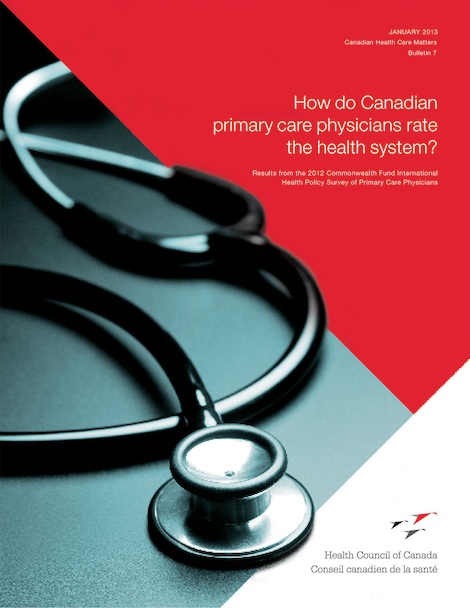
NEWS RELEASE
HEALTH COUNCIL OF CANADA
*************************
Primary care physicians rate health system performance - shows wide variation across Canada
How do Canadian primary care physicians rate the health system?
Health Council of Canada releases 2012 Commonwealth Fund International Health Policy Survey results
TORONTO (January 21, 2013) - Today, the Health Council of Canada released results from the 2012 Commonwealth Fund International Health Policy Survey.
As part of our Health Care Matters Series, How do Canadian primary care physicians rate the health system? examines physicians' perspectives on the performance of the health-care system.
The survey results show wide variation in how Canada's provincial health systems perform.
Internationally, even the best performing regions in Canada rank below top performing countries in most categories.
A key finding of the survey is that the adoption of electronic medical records has more than doubled nationally since 2006, with over half (57 percent) of primary care physicians now using computerized patient charts.
However, this number varies widely across provinces (from 26 percent in New Brunswick to 74 percent in Alberta), and overall we still rank second last among the 10 countries surveyed.
The number of physicians routinely using electronic prescribing has also improved, from 20 percent in 2006 to 43 percent today, and we rank third last among the 10 countries surveyed.
"The use of information technology facilitates better communication with patients, improve safety and quality, and better coordinate care," says John G. Abbott, CEO, Health Council of Canada. "While there has been significant progress across the country, we're not where we need to be."
Other areas of the survey showed continuing gaps in the system - like the 26 percent of physicians who say their patients often have difficulty paying out-of-pocket health costs (such as medication), similar to the 25 percent in 2006.
However, this too varies across provinces, with more than 40 percent of patients in the Atlantic provinces struggling to afford the care they need.
From a national perspective, Canada shows no improvement in any areas of access to care that we could track since 2006.
"We hope that our comparative findings help shed light on potential for improvement across the country in these areas," says Dr. Michael Moffatt, Councillor, Health Council of Canada. "Primary health care is an important part of our health system, and the most logical place to start."
The bulletin provides provincial and international comparisons of primary care physicians' responses based on their experiences with access to care, coordination of care, use of information technology, and practice improvement and incentives.
It also provides results over time, comparing findings from 2006 to 2012.
To read the full report, visit here.
About the Health Council of Canada
Created by the 2003 First Ministers' Accord on Health Care Renewal, the Health Council of Canada is an independent national agency that reports on the progress of health care renewal.
The Council provides a system wide perspective on health care reform in Canada, and disseminates information on innovative practices across the country. The Councillors are appointed by the participating provincial and territorial governments and the Government of Canada.
About the Survey
The 2012 Commonwealth Fund International Health Policy Survey of Primary Care Doctors reflects the perceptions of a sample of 2,124 primary care doctors across Canada, and a total of almost 10,000 physicians across 10 countries: Australia, Canada, France, Germany, the Netherlands, New Zealand, Norway, Switzerland, the United Kingdom, and the United States.
The Health Council of Canada was a key contributor to the design and funding of this survey.
The expanded sampling for the 2012 survey in Canada was supported by the Health Council of Canada, the Alberta Health Quality Council, Health Quality Ontario, Commissaire à la santé et au bien-être du Québec, and Canada Health Infoway.
*************************